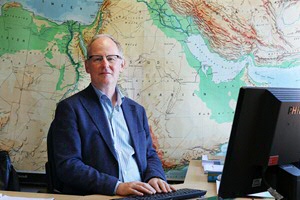Wout van Bekkum appointed Officer of the Order of Orange-Nassau

On 24 April, Prof. Wout van Bekkum was appointed Officer of the Order of Orange-Nassau. Van Bekkum (Winschoten, 1954), Professor of Middle Eastern Studies in the Faculty of Arts at the UG, made a crucial contribution to the establishment of his field in Groningen. In 2011, he updated the classical programme in Languages and Cultures of the Middle East and devised a more modern version: Middle Eastern Studies. He is seen as an essential figurehead, an outstanding researcher and an inspiring, gifted lecturer in both the Netherlands and abroad.
Personal involvement in Judaism
Throughout his career, Van Bekkum has worked hard for the Jewish community and Jewish heritage in Groningen. He played an active role within the Folkingestraat Synagogue Foundation for 34 years, and translated the Jewish inscriptions on thousands of gravestones for the Mr. Jan de Vey Mestdagh Foundation. His interest in Judaism began at the age of 12, when he first heard that his mother was Jewish and been the only member of her family to return to the Netherlands from Auschwitz after the war. This revelation was largely instrumental is his decision to study Semitic languages. The year that he spent studying in Jerusalem also had a huge impact on him. As he wrote in his thesis in 1988: ‘The inspiration came from Jerusalem, but the blood, sweat and tears of writing took place in Groningen.’
Academic curiosity and intellectual courage
During his academic career, Van Bekkum developed into one of the leading international academics in the field of mediaeval Hebrew poetry and Hebrew and Judeo-Arabic linguistics. His primary field of interest is the Hebrew pyyut: the liturgical poetry that forms one of the main pillars supporting the Jewish religious identity of the Late Antiquity and the Middle Ages. His numerous publications made a prominent contribution to making many previously unpublished Hebrew texts accessible to a wider public, interpreting their meaning correctly and putting them into a cultural-historic context. He has an unprecedented grasp of Jewish Studies, which stems from a combination of unbridled academic curiosity and intellectual courage. His enviable sensitivity to the controversial issues in public debate formed an important part of his ability to make history accessible to various tiers of society.
International recognition as an academic
For many years, Van Bekkum combined his job at the UG with a part-time professorship in Modern Jewish History at the University of Amsterdam, proving his dedication to academia. He also worked closely with researchers from Kyoto University in Japan, particularly in the field of the pyyut. He sees himself as the Groningen representative of research into the Middle East in the Far East. His publications include five academic monographs, seven compilations and some 160 articles in academic journals, books and encyclopaedias. His academic work gained special recognition in 2003, when he was invited to become a member of the Royal Netherlands Academy of Arts and Sciences (KNAW). In 2008, he was honoured with a fellowship from The Japan Society for the Promotion of Science.
Fighting the corner for Middle Eastern Studies
When the programme in Languages and Cultures of the Near and Middle East ran into difficulties around 2007-2008 due to dropping student numbers and increasing dissatisfaction with the programme, Van Bekkum fought hard to keep the field and the department at the UG. He was brave enough to devise a completely new curriculum, which would later become the new programme in Middle Eastern Studies. He managed to persuade the staff to embark upon the transition and was also able to recruit new highly talented members of the team. His revitalization and enrichment of a traditionally highly specialized field allowed him to launch a new programme that appealed to large numbers of students. Graduates from this programme soon find jobs in the legal system, or with refugee organizations, government ministries and universities.
Driving force and committed administrator
As an administrator, Van Bekkum was keen to help wherever he could. For example, he sat on numerous committees and joined the new cluster board after a major reorganization in the Faculty of Arts. He also earned his international spurs as an administrator: he was the founder of the international Medieval Hebrew Poetry Colloquium and chaired the J. Gonda Fund, which funds academic research into Sanskrit and other classical Indian languages. As secretary of the European Association for Jewish Studies, he was the driving force behind the organization of the fourth Quadrennial Congress of this thriving European professional association in Amsterdam. The conference represented a milestone for the emancipation of Dutch Jewish Studies.
Extraordinarily popular among students
Van Bekkum is a dedicated, erudite, inspirational, enthusiastic lecturer, who is extraordinarily popular among students. In their eyes, he seems to know everything and never accepts anything but total commitment on their part. He has an exceptional gift for showing students how to enjoy acquiring knowledge and learning new, exotic languages, always encouraging them to be inquisitive, search for answers and be amazed by the world around them. He always allows his students and PhD candidates to benefit from his vast international network. In addition, he was a highly inspirational PhD supervisor.
Read more
| Last modified: | 24 April 2020 12.43 p.m. |
More news
-
16 December 2024
Jouke de Vries: ‘The University will have to be flexible’
2024 was a festive year for the University of Groningen. Jouke de Vries, the chair of the Executive Board, looks back.
-
10 June 2024
Swarming around a skyscraper
Every two weeks, UG Makers puts the spotlight on a researcher who has created something tangible, ranging from homemade measuring equipment for academic research to small or larger products that can change our daily lives. That is how UG...
